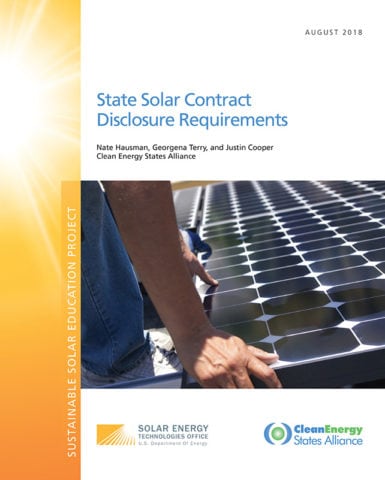State Solar Contract Disclosure Requirements
Nate Hausman, Georgena Terry, and Justin Cooper - CESA
A rapidly growing residential solar market has created challenges for solar consumers. With so many households adopting solar and more PV systems installed, there is potential for solar consumer protection issues to emerge. Relatively few people who have invested in solar have been unhappy with their purchases, but even a small number of bad experiences deserves attention.
States have grappled with how to deal with solar consumer protection issues, such as high-pressure sales tactics and misleading projections of consumers’ cost savings. One mechanism states have used is to require certain solar contract disclosures—provisions, statements, or information that must be included in all executed solar contracts. Because solar installation is usually a transactive process between a solar company and a customer, the point of sale (or lease or power purchase agreement) offers a place for states to exercise leverage ensuring customers have access to key information and guarding against misleading or inaccurate sales representations.
This report examines existing state solar contract disclosure policies and explores the areas of commonality and divergence among these state policies. It traces the development of contract disclosure policies in different states and includes detailed information on the specific provisions that have been adopted by 15 states. It also contains complete copies of 7 states’ disclosure forms.
This report will be an invaluable resource for any state that is considering how to address solar consumer protection. It will also be of interest to a wide range of stakeholders involved with solar development and consumer protection.
Note: Corrections to this report regarding Minnesota were added in October 2018.
Associated Project(s):
Resource Details:
Date: August 2, 2018
Type: Report
Topic(s): Solar Consumer Protection, Solar PV

